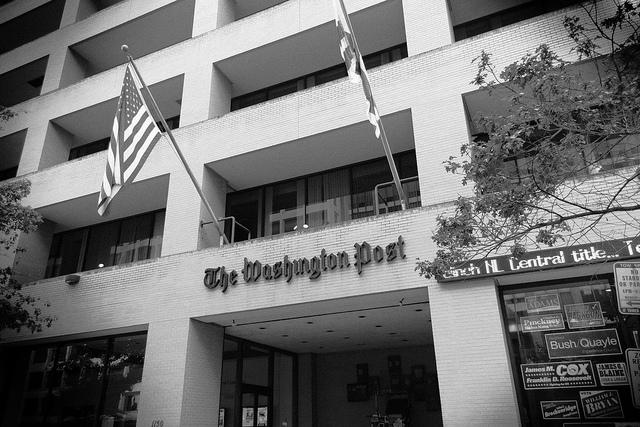Edward Snowden, the media and the Pulitzer
Posted By Andrew Davies on April 23, 2014 @ 14:30
The decision last week to award a Pulitzer Prize to the Guardian and Washington Post [2] newspapers for their coverage of classified material leaked by Edward Snowden has refocused attention on the pros and cons of both Snowden’s and the newspapers’ actions.
Some have praised the decision [3] and have hailed the newspapers for being both ‘judicious and brave’ in their handling of the material. Others, including one of my ASPI colleagues [4], see little value in awarding the prize for what amounts to an unauthorised release of state secrets.
In truth, there’s merit in both positions. Unlike Wikileaks before it, which largely released material that was embarrassing to governments and militaries but has been of little lasting security harm, the Snowden case involves extremely sensitive material that has the potential to cause deep and lasting harm to the ability of America’s intelligence agencies—and, because of the five eyes relationship, Australia’s—to perform their roles. Making public some of the access points for interception of material, and the technological tricks required to exploit it, will play to the advantage of those trying to keep their communications out of the hands of American and allied agencies. And the nature of the intelligence business is that it’ll be difficult to know what’s been lost—it’s hard to quantify intercepts that don’t happen.
In some cases that won’t be such a bad thing. I’ve argued before that intelligence collection against European allies didn’t pass the cost–benefit test [5] that should’ve been applied. Losing those information channels probably won’t do the West’s security interests any harm. But taking a black and white view and painting American intelligence as the bad guys in all this makes little sense. In some cases, such as Snowden’s release of information about methods used to intercept al-Qaeda communications [6] in their Mosul network, that clearly isn’t the case. Some of those aided by Snowden are clearly in the ‘black hat’ camp by any reasonable measure, and both terrorist groups and authoritarian states will benefit from knowing the ‘tricks of the trade’ used by the US and its allies.
The fact that Snowden himself is now ensconced in Russia and is offering himself up as an asker of Dorothy Dixers to Mr Putin [7] suggests that he’s somehow managed some prodigious mental gymnastics of self-justification. That said, some good will also come of Snowden’s actions. Some of the NSA’s activities that were disclosed weren’t consistent with stated practice. The subsequent investigations by the press and civil liberty groups have uncovered material that makes the initial release reasonably fall into the whistle-blowing category. It seems clear that oversight wasn’t working as designed, and that the NSA wasn’t even working especially cooperatively within that system. The New York Times reported [8] on a ruling from the Foreign Intelligence Surveillance Court [9]—a body set up to oversee the NSA’s collection activities on US soil. It was sharply critical of both the NSA’s ‘repeatedly inaccurate statements’ to the court and of some of its collection and analysis activities, which it judged to be unconstitutional and misleadingly reported to oversight bodies.
It’s hard to argue that it’s not in the public interest to have an open discussion of the matters raised in the NY Times article. That’s especially the case when the efficacy of the oversight mechanism itself is called into question by the judge charged with administering it:
“Contrary to the government’s repeated assurances, N.S.A. had been routinely running queries of the metadata using querying terms that did not meet the standard for querying,” Judge Bates recounted. He cited a 2009 ruling that concluded that the requirement had been “so frequently and systematically violated that it can fairly be said that this critical element of the overall … regime has never functioned effectively.”
Similarly, it’s a principle of good government that the expenditure of taxpayer’s funds should be done as transparently as possible. The post-9/11 ‘black hole’ that was the US intelligence budget violated that principle for no good purpose. It’s hard to see how the Washington Post imperilled anyone’s security by a selective release of the FY2013 budget papers [10]. For example, knowing that 33% of the budget was going to countering violent extremism while only 8% was being spent on enhancing cybersecurity can only help inform a debate on the relative priority of those issues.
When assessing Snowden’s behaviour, the good outcomes (which are relatively easy to identify) have to be weighed against the bad (which mightn’t be so obvious) and I think he’s done more harm than good. But I can’t be similarly critical of the press. A robust liberal democracy depends on both an informed population and a fractious and difficult press that’s prepared to follow the dictum [11] that ‘news is something that someone doesn’t want printed ‘. That’s certainly been the case here.
Andrew Davies is senior analyst for defence capability and director of research at ASPI. Image courtesy of Flickr user Max Borge [12].
Article printed from The Strategist: https://aspistrategist.ru
URL to article: /edward-snowden-the-media-and-the-pulitzer/
URLs in this post:
[1] Image: https://aspistrategist.ru/wp-content/uploads/2014/04/8042224968_542781420a_z.jpg
[2] Pulitzer Prize to the Guardian and Washington Post: http://www.pulitzer.org/citation/2014-Public-Service
[3] praised the decision: http://www.newyorker.com/online/blogs/closeread/2014/04/the-snowden-pulitzer.html
[4] including one of my ASPI colleagues: http://www.theaustralian.com.au/media/pulitzer-is-a-reward-for-treacherous-actions/story-e6frg996-1226890741591
[5] didn’t pass the cost–benefit test: https://aspistrategist.ru/americas-own-goal/
[6] methods used to intercept al-Qaeda communications: http://www.csmonitor.com/World/Security-Watch/Backchannels/2014/0130/More-Snowden-leaks-and-this-time-Al-Qaeda-is-the-surveillance-target-video
[7] asker of Dorothy Dixers to Mr Putin: http://www.smh.com.au/world/does-russia-spy-on-millions-edward-snowden-asks-vladimir-putin-on-live-tv-20140418-zqw5o.html
[8] New York Times reported: http://www.nytimes.com/2013/08/22/us/2011-ruling-found-an-nsa-program-unconstitutional.html
[9] ruling from the Foreign Intelligence Surveillance Court: http://www.nytimes.com/interactive/2013/08/22/us/22nsa-opinion-document.html
[10] selective release of the FY2013 budget papers: http://www.washingtonpost.com/blogs/wonkblog/wp/2013/08/29/your-cheat-sheet-to-americas-secret-intelligence-budget/
[11] follow the dictum: http://www.abc.net.au/mediawatch/transcripts/s3989258.htm
[12] Max Borge: https://www.flickr.com/photos/maxmborge/8042224968
Click here to print.
